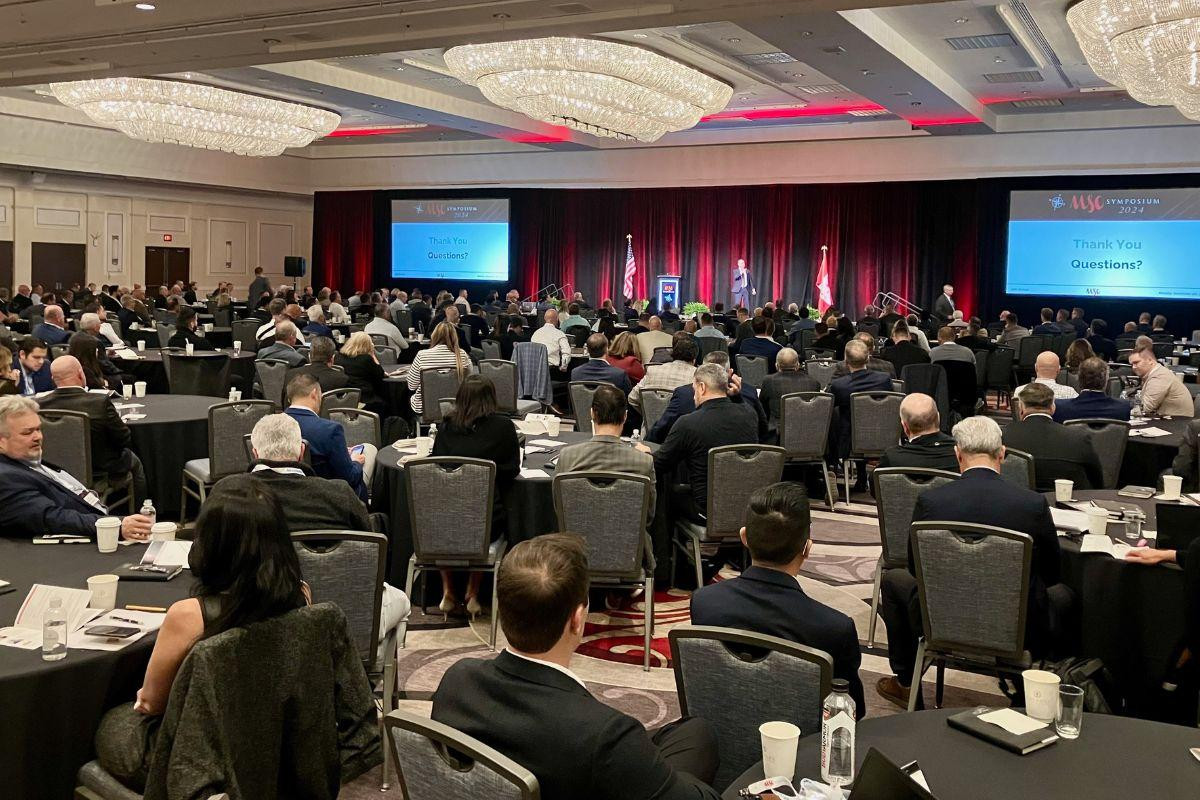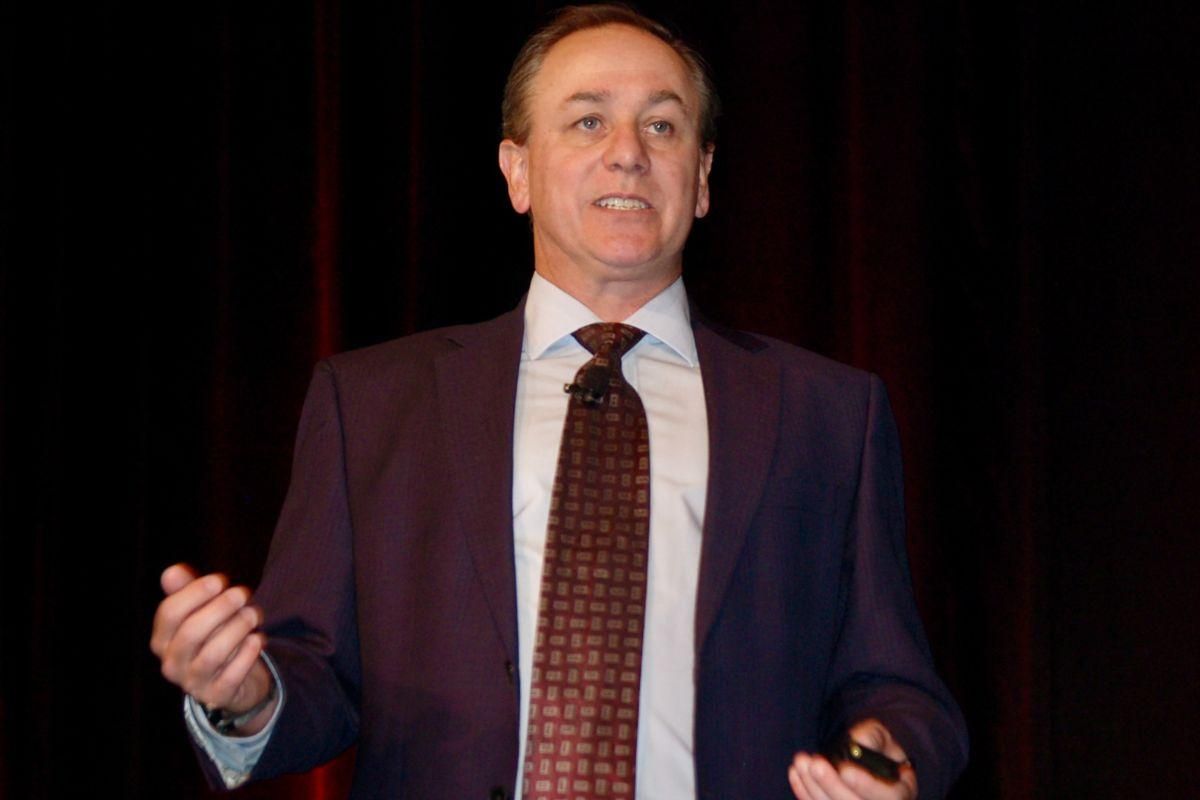The MSO Symposium, an annual one-day conference created by and for multi-shop owners and operators, was among the events kicking off SEMA week in Las Vegas in early November. About 400 people attended the event, the most in its 13-year history.
With consolidation continuing in the industry, David Roberts of Focus Advisors provided a market update, saying he sees no decline in private equity firm’s involvement in the industry.
“It’s clear there is really continued strong interest from private equity firms,” Roberts said. “There’s going to be money to help you grow or to exit when you feel it’s time. We don’t see any slowdown in this.”
In a presentation titled, “Where the Economy is Headed in 2025 and Beyond,” Nasdaq chief economist Phil Mackintosh said the U.S. is in what he called a “Goldilocks” economy.
 More than 400 people attend the annual MSO Symposium in Las Vegas during the SEMA week, the largest attendance in the event’s 13-year history.
More than 400 people attend the annual MSO Symposium in Las Vegas during the SEMA week, the largest attendance in the event’s 13-year history.
“We’re not too hot, we’re not too cold,” he said, noting that inflation is essentially back to the Federal Reserve target level, and the unemployment rate is “close to multi-decade lows.”
“Most of the developed economies in the world have avoided recession but kind of ‘just’ avoided,” Mackintosh said. “They’re not growing that strongly. The U.S. is a little bit of an exception. It’s growing much stronger than most of the other markets. So we’re doing really well.
“But the reality is there’s not too much heat in the global economy anymore. So it makes total sense that interest rates are coming down from the highs that they got to as central banks started to tackle the inflation problem. I could argue that maybe the U.S. should have followed Canada’s lead and started a bit earlier and gone a bit further by now,” he said, adding he thinks the current 5% interest rates should be closer to 3% “sooner rather than later.”
The Fed cut rates by a quarter-point three days after Mackintosh spoke.
He shared data showing that wage increases have outpaced inflation at all income levels by 3.3% or more.
“I know it’s hard to believe because people seem to think inflation has been much higher than wage growth,” he said. “But across the board, wages gone up more than inflation.”
He said the recent uptick in unemployment is different from the past in that it’s not being caused by layoffs.
“We are pretty close to 20-year lows in terms of layoffs,” he said. “So what’s interesting is what is causing the uptick in unemployment is prime age workers coming back into the workforce. There’s a lot more people looking for work. It’s totally different from a consumption perspective because when they get a job, they’ll start spending, rather than it being people losing their job and stopping spending. So that’s really kind of good news that the unemployment rates are coming up because people want jobs, not the opposite. Good news for companies, too, because it takes a bit of pressure off wages.”
At one point during the “Great Resignation,” there were two advertised job openings in the U.S. for every person looking for work. “That’s now come back down pretty close to one-to-one,” Mackintosh said. “So for a company thinking about labor shortages, things look a lot better now than they did two years ago, three years ago. So again, not too hot, not too cold, right?”
Impact of Election Outcome
Speaking the day before the U.S. presidential election, Mackintosh was asked what effect the outcome might have on the economy next year. He shared a chart showing data back to the Nixon administration, with periods of growth and recession during both Democratic and Republican presidencies.
“So I have some good news: The reality it, it doesn’t really matter in terms of the stock market who wins,” he said. “For anyone who’s got an investment portfolio, it doesn’t matter who wins.”
Beyond that, he said, either candidate is likely “to increase the deficit and that could keep interest rates higher for longer, so that’s not great.”
Donald Trump’s proposed tariffs will likely raise prices, he said.
“I guess the expectation is everyone's taxes will go down at the same time, so incomes go up again, but that’s inflationary,” Mackintosh said. “So I think if there was an inflation risk on either side, it would be Trump winning. But then Harris wants to increase corporate taxes, and I’m guessing none of you guys want that either, right? So is that a good diplomatic answer?”
Key Moments Impacting Customer Satisfaction
CCC Intelligent Solutions generally offers a look at the latest industry data at the MSO Symposium, and this year was no exception, with CCC’s Kyle Krumlauf providing context to industry stats and trends his company is seeing.
Krumlauf highlighted a couple key points from a recent CCC study into the “moments of truth” in the claims and repair process, the focal points that have the most impact on customer satisfaction.
“The top driver is transparent, detailed explanation of repair needs,” Krumlauf said. “One thing I would call out here is having a good translator -- or being a good translator -- on the repair side when you're talking to a customer and helping them understand. They may not be familiar with the technologies in a vehicle, what it requires to do the repair. Making sure that someone is able to speak a language that they can understand. That seems to be the No. 1 driver in satisfaction with consumers.”
He said customers want “consistent frequency of contact with a shop throughout the process,” and “they expect a timeline and the work to be done within that timeline.” In fact, the length of time to get the vehicle repaired and back can have the biggest negative impact on customer satisfaction.
Krumlauf noted the one element of this are supplements. On claims that included a supplement, he said, the average number of supplements per claim has risen from about 1.7 as recently as mid-2021 to 2.1 this year. The average dollar amount of those supplements has risen from about $1,001 in early 2020 to $1,574 this year.
“Of course carriers want to be very, very careful in reviewing those and being sure that they're approving what is necessary,” Krumlauf said. “But CRASH Network in their quarterly surveys consistently report that one of the major causes for backlog is carrier responsiveness on [supplement] approvals. So if there’s anything that you take away from this today, there is a real opportunity to ensure that transparency and the efficiency of supplement review and supplement approvals.”
He said he’s watching corporate return-to-office policies as that, too, affects the industry because of when and how much people are driving.
“Amazon changed their policy and starting in January, they are requiring everyone to return to office full time,” Krumlauf said. “In my mind, there could be a domino effect, with other major corporations. You could see a lot more people driving during rush hour, Monday through Friday every week.”













John Yoswick